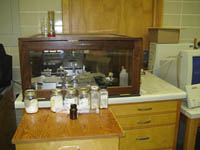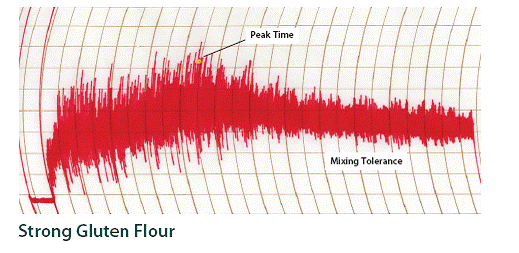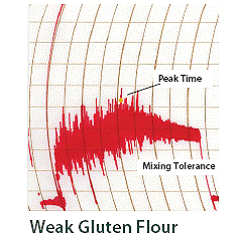Mixograph
We have three mixographs in our facilities.
The mixograph shown above is a pin mixer that rapidly develops a dough. A flour that requires 2 to 3 minutes to mix to the peak with the mixograph will have a peak time of 8 to 10 minutes on the farinograph. The great efficiency of the mixograph is because of its mixing action. The mixograph comes in 3 sizes, 35 g, 10 g, and a direct drive 2 g model. For most research work the 10 g model is preferred. The 2 g model is useful for research where sample size is limited.
A number of readings can be taken from the mixogram but many users prefer to look at the curve in total to judge the properties of the flour. The peak of the mixogram is generally easier to determine that that of a farinogram (if in doubt, the intersection of lines drawn down the center of the ascending and descending parts of the curve will detail the peak). Other factors that are important are the width of the curve at the peak (wider for stronger, more elastic doughs), the rate of breakdown after the peak (the steeper the angle the less mixing tolerance), and the width of the curve after overmixing (this reading should be taken as a percentage of mixing time; for example, the width of the curve after overmixing by 50%).
In the mixograph, the curve height is allowed to vary. At optimum water, the curve height is generally related to the protein content of the sample.
The optimum water absorption is determined by the curve shape as shown at the right. A curve with many wild swings before the peak is generally too dry and requires more water. A curve that has a sway in the development part of the curve is too wet. In a relatively short time any one can learn to “read” a mixogram.


Information source: "Wheat and Flour Testing Methods: A Guide to Understanding Wheat and Flour Quality: Version 2"
